ASTANA – During a visit to Kazakhstan on April 10, President Ilham Aliyev of Azerbaijan met with Kazakh President Kassym-Jomart Tokayev, with the two leaders showing a solid commitment to strengthening bilateral relations. Key outcomes included the decision to establish a Supreme Interstate Council and six memorandums of cooperation to foster partnership in the development of small and medium businesses, science and research, media, sports, and culture.
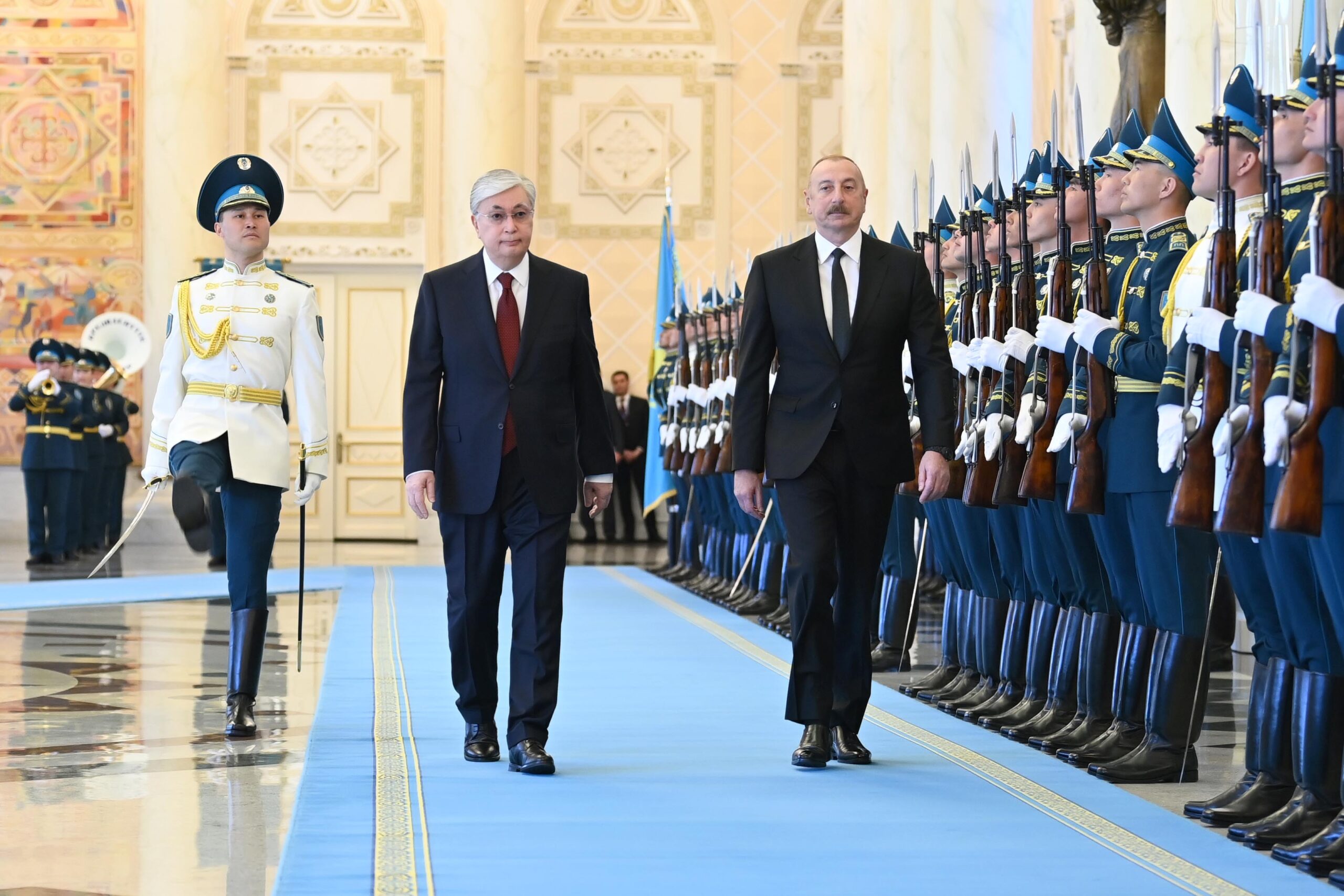
President Tokayev welcomes Ilham Aliyev at the Akorda presidential residence on April 10. Photo credit: Akorda.kz
The visit took place against the backdrop of increased regional cooperation, particularly in energy, transportation, and security, which have been significantly disrupted because of the conflict in Ukraine. It also comes just nine months after Tokayev’s visit to Baku in August 2022, which many experts described as “special”. During that visit, the two leaders signed a declaration on strengthening strategic relations and deepening allied engagement, as well as a comprehensive program of cooperation development for 2022-2026, reflecting the strategic nature of bilateral ties.
Addressing the media after the meeting with Aliyev on April 10, Tokayev said many agreements reached during his visit to Baku had been put into practice.
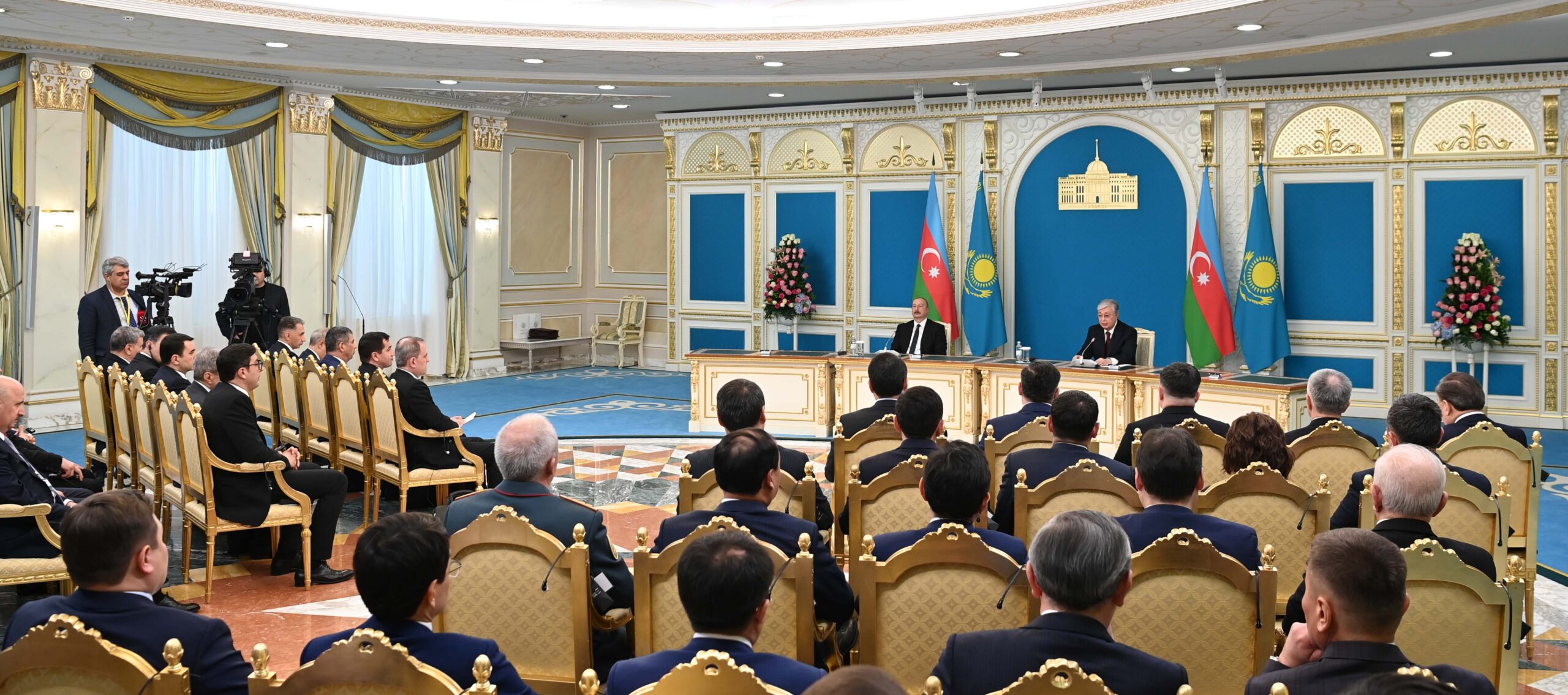
Tokayev and Aliyev speak to the press following their meeting on April 10. Photo credit: Akorda.kz
“Thanks to our joint efforts, relations between Kazakhstan and Azerbaijan have become even more open and comprehensive in recent years. Political, trade and economic, cultural and humanitarian cooperation has intensified,” said Tokayev.
Miras Zhienbayev, a chief expert at the Kazakhstan Institute of Strategic Studies, stressed the importance of these visits as they create an “important and fundamentally new dynamic in the bilateral agenda.”
“Kazakhstan has excellent relations with Azerbaijan. In the current period of international relations, when the confrontation between great powers has reached unprecedented levels, the fact that our countries can be called like-minded is an important achievement,” said the expert.
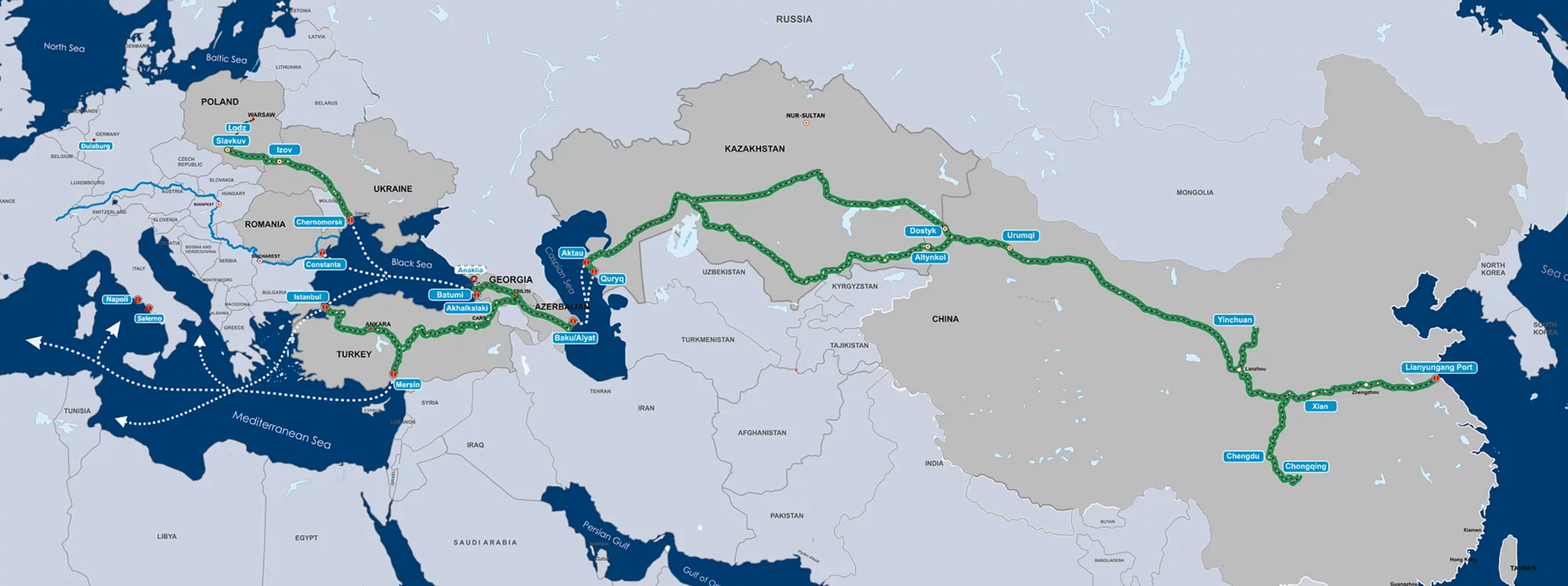
TITR starts from Southeast Asia and China, and runs through Kazakhstan, the Caspian sea, Azerbaijan, Georgia and further to European countries. Photo credit: middlecorridor.com
Given the geopolitical turmoil, investing in TITR is pivotal. TITR, also known as the Middle Corridor, is a multimodal transportation corridor that connects China, Central Asia, the Caspian Sea region, the Caucasus, and Europe. The route is an alternative to the traditional sea and land routes between Asia and Europe, offering faster and more efficient transportation of goods, as well as to the northern route passing via Russia.
The Baku Declaration and roadmaps for the simultaneous elimination of bottlenecks and the development of the Middle Corridor for 2022-2027, signed by the foreign and transportation ministers of Kazakhstan, Azerbaijan, Georgia and Türkiye in November 2022, envision measures for the development of TITR.
One of the major projects the two countries are implementing is laying a fiber-optic communication line (FOCL) along the bottom of the Caspian Sea on the Azerbaijan-Kazakhstan route. According to the Kazakh Ministry of National Economy, the project cost is estimated at 22.8 billion tenge ($50.4 million).
“It is really important for us to diversify supply chains and restore the chains that were disrupted due to the current sanctions policy,” Zhienbayev added.
The expert also sees strengthening economic sovereignty as a key task for both countries.
Trade and investments are on the rise
Both Tokayev and Aliyev agreed the potential for trade and economic partnerships remains untapped and emphasized the need to expand the range of goods for export and import. President Tokayev said he believes trade turnover can reach $1 billion due to the economic potential of Kazakhstan and Azerbaijan.
According to the Kazakh Ministry of National Economy, trade between Kazakhstan and Azerbaijan reached an all-time high of $461.9 million last year, growing by 40 percent compared to 2021. The volume of bilateral trade in agricultural products has tripled, reaching $146 million.
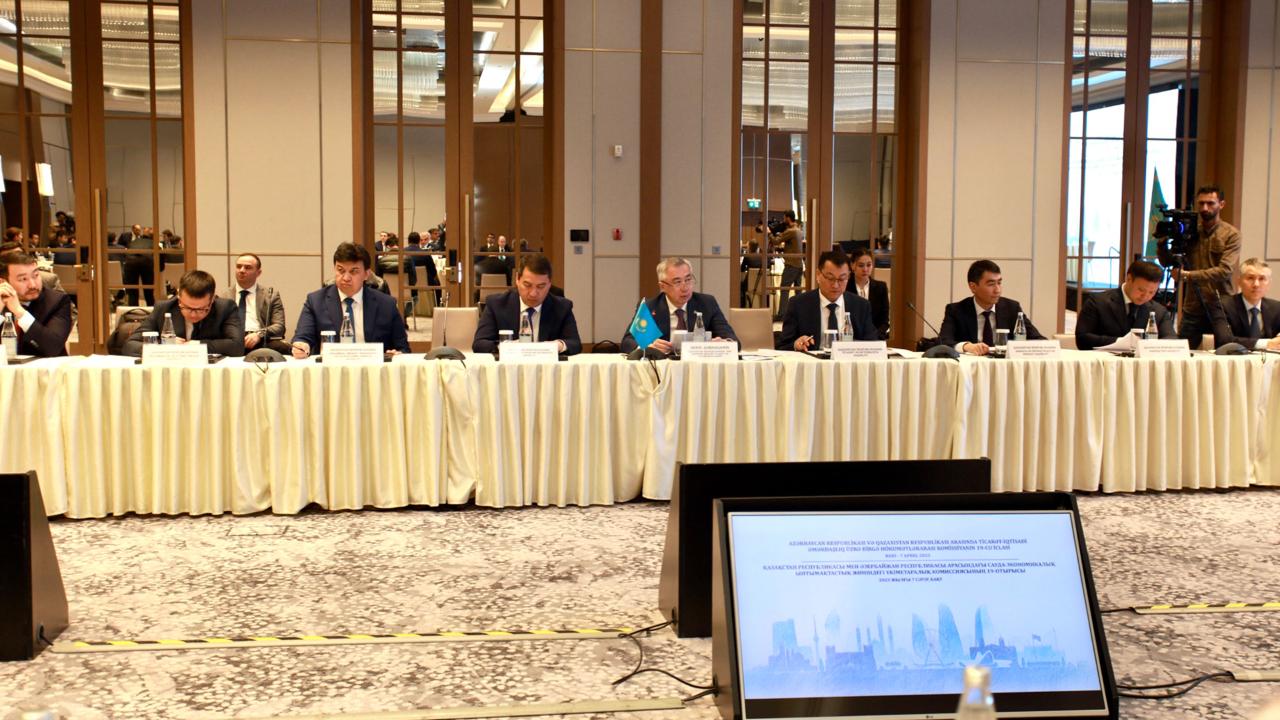
On April 7, Baku hosted the 19th meeting of the Kazakh-Azerbaijani Intergovernmental Commission on Trade and Economic Cooperation. Photo credit: Kazakh Ministry of Trade and Integration
Exports to Azerbaijan surged 30 percent to $375.3 million, primarily driven by a 3.6-fold increase in wheat exports, which account for 26 percent of the nation’s total exports to Azerbaijan. Kazakhstan is the second largest supplier of wheat to Azerbaijan after Russia.
Besides wheat, the increase in exports was also influenced by a three-fold increase in supplies of oil products, reaching $84.5 million and the resumption of oil supplies of $74.9 million.
Kazakhstan also exports rolled metal products, railway locomotives, electric batteries, mineral fertilizers, and food products such as rice, vegetables, chocolate and other confectionery.
Imports grew by a staggering 90 percent to $86.6 million, driven by the start of shipments of watercraft ($22 million), seamless pipes ($7.7 million), sugar ($13.7 million), and mineral water ($7.3 million).
An upward trend continued in 2023, with trade growing by 14 percent so far.
Last year, Azerbaijan’s investments in Kazakhstan reached $69.7 million, the highest since 2005. Investments were largely made in Kazakhstan’s oil and gas sector.
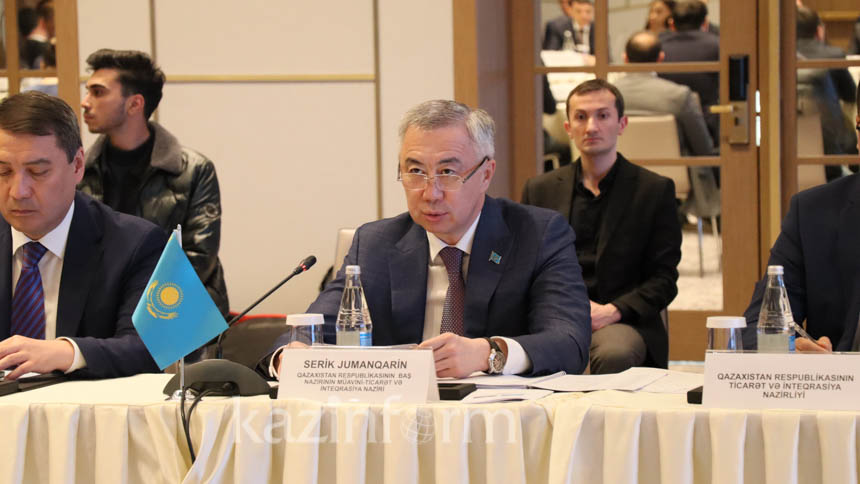
Serik Zhumangarin addresses the intergovernmental commission. Photo credit: Kazinform
The bilateral trade mission on April 5 in Baku signed export contracts worth $55 million to supply batteries, sheet steel, and food products. According to Deputy Prime Minister – Minister of Trade and Integration Serik Zhumangarin, Kazakhstan is working to include 110 non-resource goods worth over $304 million in exports.
“Azerbaijan’s market is of great interest for the export of Kazakhstan’s processed products,” said Zhumangarin in Baku. He informed that Kazakhstan is interested in implementing infrastructure projects to remove bottlenecks along TITR, creating a joint venture to effectively manage the growing flows of interregional trade and providing the shortest route from the Caspian region to Europe.
Humanitarian cooperation and common Turkic roots
Zhienbayev noted the focus on humanitarian aspects during Ilham Aliyev’s visit to Astana.
“We have important moments in our history. We remember the forced relocation of ethnic Azerbaijanis to Kazakhstan. It is this traumatic experience that has become a very important and truly positive asset of our cooperation now because by together overcoming that difficult stage in the history of Azerbaijan, we can genuinely talk about cultural civilizational commonality, including Turkic,” he said.
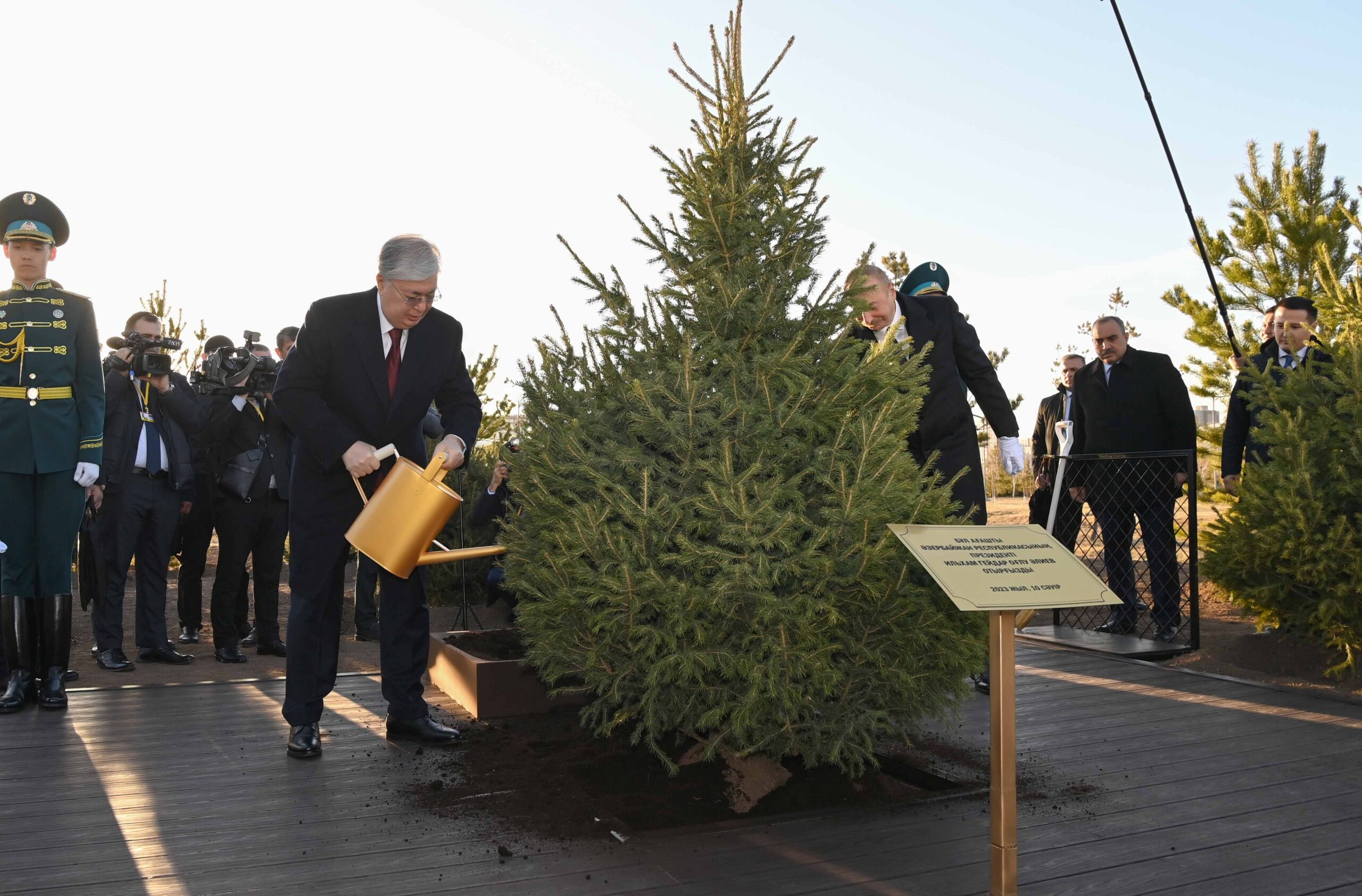
After the street opening ceremony, Ilham AliyeThe Turkic roots shared by Kazakhstan and Azerbaijan have created a strong foundation for their political, economic, and social relations. They are an integral part of ties between Azerbaijan and Kazakhstan, Alibek Tazhibayev, director of Kazakhstan’s Eurasian Monitoring Center for Analytical Studies, said in an interview with Baku-based Report news agency.
“Among the Turkic countries, Azerbaijan and Kazakhstan occupy some of the leading positions in all spheres without exception. An even closer cooperation between our countries will certainly have a positive impact on the development of relations between the Turkic countries,” he said.v planted a tree in the Botanical Garden. Photo credit: Akorda.kz
The Turkic roots shared by Kazakhstan and Azerbaijan have created a strong foundation for their political, economic, and social relations. They are an integral part of ties between Azerbaijan and Kazakhstan, said Alibek Tazhibayev, director of Kazakhstan’s Eurasian Monitoring Center for Analytical Studies, in an interview with Baku-based Report news agency.
“Among the Turkic countries, Azerbaijan and Kazakhstan occupy one of the leading positions in all spheres without exception. An even closer cooperation between our countries will certainly have a positive impact on the development of relations between the Turkic countries,” he said.
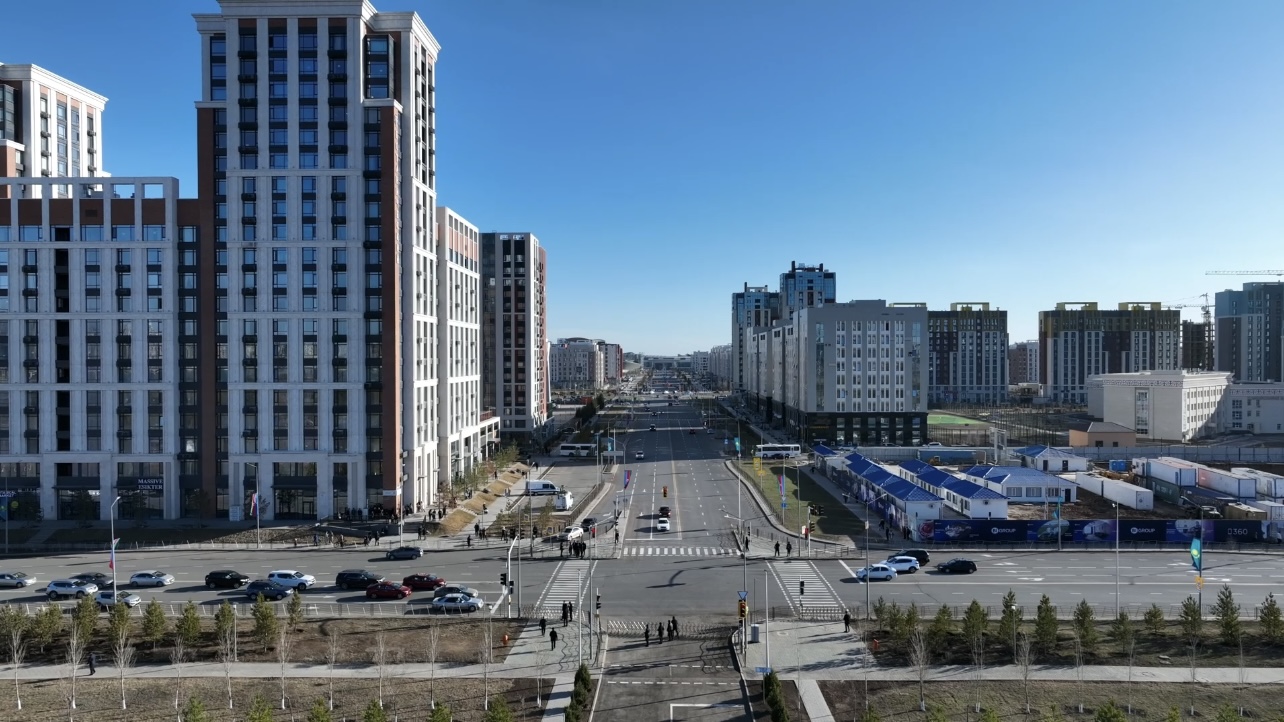
The street in Astana near the Botanical Park was named after Heydar Aliyev. Photo credit: Akorda.kz
Nikita Shatalov, a member of the Mazhilis, the lower chamber of the Kazakh Parliament, is of a similar opinion.
“2022 was the beginning of the restoration of the Turkic vector in our foreign policy. The Azerbaijan – Türkiye direction, in addition to offering direct trade and economic opportunities and cultural-humanitarian cooperation, is also another bridge to the European Union, which to some extent should replace Russia, which is now excluded from global trade in many areas,” said Shatalov.
During the Azerbaijan President’s visit to Kazakhstan, Tokayev and Aliyev together opened Heydar Aliyev Street in Astana. Heydar Aliyev was the President of Azerbaijan between 1993 and 2003 in the first formative decade of the country’s independence.
“Our duty is to perpetuate and keep the memory of personalities such as Heydar Aliyev. By opening a new street in Astana named after him, we make an important contribution to this noble cause. This is a sign of our warm attitude and sincere respect to the great son of the Azerbaijani people,” said Tokayev.

